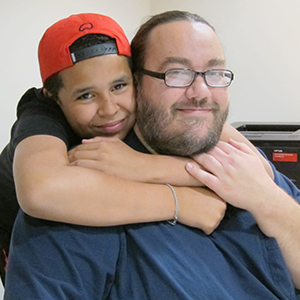Hemophilia: Tanner and Jason’s story


About this episode
Jason, is the primary caregiver of his teenage son, Tanner. Jason discusses his experience in raising a son with hemophilia – specifically in his journey of having a port, and the support he has received from Children’s Minnesota. Tanner discusses that, sometimes, hemophilia is challenging because it limits the activities he can do with his friends. However, he loves going to camp, and still lives life to the fullest.
Topics:
- Diagnosed at birth
- Hospital/clinic staff support
- Limitations: Fears and challenges
- Treatment: Medical experience
Transcript
Jason: I was unaware of his grandfather’s hemophilia, and it wasn’t really thought about at all. We didn’t think that much about it. But when he was really young, he was in the bathroom, and had just gotten out of the bath, and he’d run his finger over a little vent in the bathroom, and it started to bleed, and two or three days later, it was still bleeding a little bit, and that’s when we took him in, and they talked a little more about family history and took the test and stuff. I remember sitting down on the couch when I heard the news, and the nurse was explaining hemophilia and what it meant, and that he was positive, but they didn’t know exactly to what degree. She was talking about the different degrees, And I can remember just sitting there, hoping and praying that it would not be severe or whatnot. But I didn’t know right away until we went into the clinic for the first time. You know, at the time, you just want your kids and stuff to be healthy, and nothing bad to happen to them. Even though the nurse was very calming and soothing on the phone, I was like in another world, and how’s this going to affect him, and all the things that he wasn’t going to be able to do, and even just surviving, not knowing anything about it. So that was my initial reaction. And as we learned more about it, you kind of get more comfortable with things.
So what we ended up doing is we were involved in a study to see if we couldn’t take care of the inhibitors or get rid of the inhibitors. So we were giving him large doses of his factor and doing it fairly frequently. can’t remember how often it was, but I know for a while, it was every other day. And then we would come into the hospital at least once a month—sometimes it was a little bit more often—to get measurements to see how the dosage was affecting Tanner and his factor levels. That’s when we knew all the janitors and everybody in the hospital, because we were here so often. Why don’t you tell me about the hemophilia and your understanding of it and what it means to you?
Tanner: Well, it sucks, because you can’t do things that your friends do, like a lot of my friends play sports, and I can’t play sports with them. I like soccer, and if I didn’t have hemophilia, I’d try out for the soccer team. There are some benefits, like camp, coming to the hospital and meeting all these interesting people around.
Jason: Well, I just want you to be happy. I feel like we’re doing the best that we can in trying to keep things as normal for you as possible. I do realize that we are probably a little overprotective, when it comes to the hemophilia, even though there are days, sometimes, where I don’t even really think about it. Yeah. There just seem to be days where everything else seems to be, you know, doesn’t even cross your mind. Then there are days where you spend all day thinking about it and worrying and stuff. Dealing with Tanner’s illness, there have been many times where it was really hard and [crying] people here at the hospital really came through and helped me out and helped my family out. I feel really indebted, like there would be no way to pay back the things that have been done for me. He had a port that we would use to administer the factor for a while, until that stopped working. And then we had a Hickman, centerline catheter that we would use, and that worked out really well, as far as administering the medicine. It involved a lot of special care, because he had the tube exposed. Cling wrap will always remind me of bath time, because we used to wrap his chest up really tight and tape it up so we could get him in the bath or in the shower without getting it wet, because with that, we were always worried about infections and stuff.
Tanner: That was terrible. That sucked.
Jason: Every time he would get a fever or whatnot, it would involve a call to the hospital, and usually a run up here to where we’d get his blood tested to make sure that he didn’t have an infection or whatnot. But with that study and the treatment and stuff, his inhibitors did go away, and we really haven’t had to deal with that now for quite a while, so that’s why he’s able to just take the factor twice a week, the prophylactic, to help minimize bleeds and keep that under control. When he first had the port that was a bit of a challenge. The whole poking the needle through the skin and stuff is something that you have to get over . Tanner had a huge fear of needles when he was younger. He was quite a chubby baby, and it was hard to hit a vein for him, so just one of the many reasons that we love Sue so much, because she was an expert at it and would get them on the first try. But with the port, making sure that you hit it just right, and then if you didn’t do it, then feeling horrible about missing it the first time, and trying to stay calm so that you could get it with the second try, and that you wouldn’t have to not be able to do it and then have to come up to the hospital to get somebody else to do it. We may be a little bit overprotective sometimes, but nowadays, there are a lot of times where I don’t even think about it at all. You make sure that he has his shots, and let him run around and ride bikes and do things and stuff like that, that when I first heard about it, it was like, no way will he be allowed to do anything like that, and just want to wrap him in bubble wrap and make sure that nothing bad happens. So in that regard, it’s not nearly as bad as what I thought. But you are aware of it, and when something happens, it comes crashing back to you and you have to worry about it. But it’s not a day-to-day, minute-to-minute type worry that it was at the beginning.
Jocelyn (pediatric nurse practitioner): Is there advice that you would give other parents about how to deal with it?
Jason: Yeah, to educate yourself, learn about it, and I guess, just, it’s easy to say, but work on accepting that that’s the way it’s going to be, and learning how to deal with different situations; what to do if there’s a bleed, or you think that there might be a bleed, and how to handle it. And realize that it probably isn’t going to be as bad as what you think it’s going to be when you first hear about it.
Tanner: I guess just live life at the fullest, and just be happy for who you are and what you’ve got in life, and that you’ve got a family who cares about you. Yeah, you can’t do a lot of things that other people can do, but there are some benefits too, like meeting a lot of cool people at the hospital and going to camp, which was pretty fun. It sucks, but then it’s not as bad as you think it is. And sometimes, even I forget about hemophilia, because I’m always running around and doing stuff.
We wish to extend our thanks to the families who have shared their story here about the impact of living with hemophilia and sickle cell disease. We would also like to thank the many who worked on this project:
The Children’s Minnesota StoryCorps Legacy Team:
Eddie Gonzalez, Jocelyn Bessette Gorlin, Susan Kearney, Stephen Nelson, Margaret Heisel-Kurth, Stephanie Davis, Angela Blue, Elizabeth McDonough, Jill Swenson and Alisa Linne.
Special thanks to:
Stephanie Moua, Hamdi Hussein, Sadia Farah, Fatima Ali, Caillyn Costello, Suzanne Lehman, Suzan Ulrich, D'Ann Urbaniak Lesch, Justin Nelson, Allison Albright, Marvin Holmes-Leopold, Jose Rodriguez and Mitch Hare.
Minneapolis Institute for Production and Recording:
Jose Rodriguez and Mitch Hare.